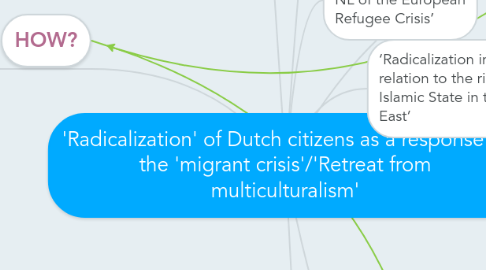
1. WHO?
1.1. 'Normal' people pushed further Right
1.1.1. The new 'Right following'
1.2. Radical Right groups
1.2.1. Pegida
1.2.2. Anti-mosque protests & petitions
1.2.3. Identitair Verzet
1.2.3.1. http://www.idverzet.org/over_idverzet/
1.3. Refugees themselves? Become more extremist as a reflection of our prejudices of them?
1.3.1. Need to distinguish between refugees themselves... C.f. Syrian; Pakistani; Afghan; Turk; Iraqi etc.
1.4. Critique of humanitarian actors?
1.4.1. Too readily treating refugees as 'helpless' establishes power relations which victimize 'the other''.
1.4.1.1. Many refugees previously educated, employed etc.
2. HOW?
2.1. www.laatzenietlopen.nl
2.2. WHERE?
2.2.1. Access to 'normal people'
2.2.1.1. Select a public location
2.2.1.2. Villages particularly áffected
2.2.1.3. Preference for qualitative? Better able to capture emotions and nuances in opinion?
2.2.1.3.1. Interviews
2.2.2. Access to the (percieved) 'radical' Right
2.2.2.1. Pegida meetings: Den Haag 15th Nov.
2.2.2.2. Social media pages
2.2.2.3. Search for local online petitions (e.g. anti-Islam; anti-mosques)
2.2.3. Access to the refugees
2.2.3.1. WelkominUtrecht facebook page
2.2.3.2. Jaarbeurs - but closing soon?
2.3. Other sources
2.3.1. Last year MA thesis: M van Herpen "Struggling over Boundaries..." Case study on Pegida in Berlin.
2.3.1.1. http://dspace.library.uu.nl/handle/1874/320431
2.3.2. M Slootman & J Duyvendak, Ch. 5 'Fear, Anxiety and National Identity'
2.3.3. M. Van Bruinessen "Public Debates about Islam in Europe: Why and How 'Immigrants become 'Muslims'. After Van Gogh: Roots of Anti-Muslim Rage" (Google scholar search: radicalisation Dutch nationalism migration crisis)
2.3.3.1. Cited by
2.3.3.1.1. Thesis by Visser, MS. "Nationalist-populist rhetoric & the demise of Dutch multiculturalism: what future for Muslim minorities"
2.3.3.1.2. A Brown "Visualizing Uncertainty: Opposition to Islam in the Netherlands Through the Lens of Fitna: The Movie"
2.3.3.1.3. MP Vink "Dutch 'multiculturalism' beyond the polarization myth"
2.3.3.2. Related articles
2.3.3.2.1. D Elfersy "Got Faith? The integration of Muslims in the Netherlands"
2.3.4. K Norman "Equality and Exclusion: 'Racism' in a Swedish Town"
2.3.5. http://pauw.vara.nl/media/347614 from 23:00 mins, interview with Pegida leader
2.3.5.1. "We are for everyone who is not satisfied with the current situation, in a demonstration there are people with 25 different reasons for being there.." [32:00 mins]
2.3.6. M King & D Taylor "Radicalization of Homegrown Jihadists" [Google Scholar search: 'Radicalization']
2.3.7. Party Politics "Contagious Parties: Anti-Immigration Parties and Their Impact on Other Parties" [Google Scholar citations: 'Extremist Nationalism']
2.3.7.1. http://ppq.sagepub.com/content/16/5/563.full.pdf+html
2.3.8. Anti-Facistische Actie "De rol en het gevaar van extreem-rechts bij het anti ISIS protest"
2.3.8.1. https://afanl.wordpress.com/2014/08/13/de-rol-en-het-gevaar-van-extreem-rechts-bij-het-anti-isis-protest/
2.3.9. J van Stekenlenburg "Going All the Way: Politicizing, Polarizing, and Radicalizing Identity Offline and Online" [Google Scholar search: 'Dutch Nationalism']
2.3.9.1. http://onlinelibrary.wiley.com/doi/10.1111/soc4.12157/full
2.3.10. Email sent to Emma's BA thesis supervisor
2.3.11. Klingeren, Boomgaarden, VLiegenthaart, and de Vrees "Real World is Not Enough: The Media as an Additional Source of Negative Attitudes Toward Immigration, Comparing Denmark and the Netherlands "
2.3.11.1. http://esr.oxfordjournals.org/content/early/2014/12/10/esr.jcu089.abstract
2.3.12. de Koning, Jaffe and Koster "Citizenship agendas in and beyond the nation-state: (en)countering framings of the good citizen"
2.3.12.1. http://www.tandfonline.com/doi/full/10.1080/13621025.2015.1005940
2.3.13. P Neumann "The Trouble With Radicalization"
3. THEORETICAL FRAMEWORKS
3.1. Human needs theory
3.1.1. Gurr: relative deprivation
3.1.1.1. 'They take our jobs and homes''
3.2. Social identity theory
3.2.1. Tajfel
3.2.2. Brewer
3.2.3. In-group love/out-group-hate
3.3. Discourse analysis
3.3.1. Discourse and frames of 'terrorist; 'welfare-seeking' others
3.3.2. Symbols: new mosques; different types of store; new languages etc.
3.3.3. War on Terror
3.4. Alliance thoery: Kalyvas
4. 'The impact on the NL of the European Refugee Crisis’
5. ‘Radicalization in the NL in relation to the rise of the Islamic State in the Middle East’
6. WHY?
6.1. What different insecurities are triggering negative perspectives of migrants/refugees?
6.1.1. Different background demographics of Dutch citizens
6.1.2. Employment
6.1.3. Cultural heritage
6.2. What different emotions/behavioural patterns do these insecurities translate into?
6.2.1. Fear
6.2.2. Anxiety
6.2.3. Caution
6.2.4. Anger/aggression
6.2.5. Isolation
6.2.6. Discrimination
6.2.7. Even hate?
6.3. Who plays a role in framing these insecurities?
6.3.1. Radical Right groups
6.3.2. Media interpretation
6.3.2.1. Q. What really is extremism?
6.3.2.2. Do Pegida portray themselves as extremists? C.f.
6.3.2.2.1. Official mandate
6.3.2.2.2. Actions
6.3.2.2.3. Beliefs of members/supporters - new and old
6.3.2.2.4. How they are generally percieved
7. WHAT?
7.1. What are people actually reacting to?
7.1.1. What they are shown
7.1.2. Building of shelters
7.1.3. Personal experience of 'the other''
7.1.4. Personal struggles
7.1.5. Influx of people
7.2. Refugees or migrants?
7.2.1. For many, the two are synonymous?
7.3. What is radicalization?
7.3.1. M Sedgwick "The Concept of Radicalization as a Source of Confusion"
8. Sensitizing Concepts
8.1. Antagonistic identities
8.2. Enemy images (othering)
8.3. Collective mobilisation
8.4. Discrimination (intolerant monoculturalism)
8.4.1. Duyvendak et. al 2015 Feeling Dutch: The culturalization and emotionalization of citizenship and second generation belonging in the Netherlands
8.5. Relative deprevation
8.6. Multiculturalism
8.7. Monopolising violence
9. Research Puzzle
9.1. How can discursive formation theory help to interpret the radicalization within the different levels of the right-wing non-political organization PEGIDA, particularly as a response to the European Refugee Crisis (as 'mediarized' in 2015)?
9.1.1. How do different levels know what they claim to know?
9.1.1.1. What is role of violence within the response?
9.1.1.2. How do different members describe/perceive Pediga? C.f. what is officially stated on the website; what they say in interviews etc.
9.1.1.3. What is the interrelation/alliance between organizers and followers? C.f. leadership, old members & new members (pre- & post- media attention on migrant crisis), Home-German members & local Dutch members.
9.1.1.4. What leads followers of the discourse to be present (Q. for interviews at the Rotterdam demonstration)?
9.1.1.5. How can popularity be measured? Social media following; rally attendances; media attention; political influence etc.?
